Newsletter
| Animals' Angels
PO Box 1056 Westminster, MD 21158
|
|
Dear Animal advocate,
The year is soon over and AA investigators have been really hard at work. We have been on the road more than ever before for both farm animal and horse slaughter issues. We are excited to tell you about our work and developments since the summer. And we know how important it is to you that you know what we are finding and what progress we are making to benefit the lives of animals.
The big picture is that there is quite a lot of work for us to do. At auctions in every part of the country treatment of the animals was very disappointing. The handling of old dairy cows at auction was especially dreadful. These animals will be an important focus for us next year. Working with auction owners to establish guidelines and implement employee training programs as we have this year, shows that real, substantive progress is possible.
On the issue of horse slaughter, the bill in Washington has once again stopped moving forward and AA has begun working on a different angle. As you will learn in this newsletter, we are working more directly with the European Union, focusing on consumer awareness, stricter regulations and import conditions. There is solid potential for progress and we will be moving forward in this area in 2010.
We have also focused on the transport of all animals, especially in cases when travel time is in excess of 28 hours, without water, food, or rest. We will continue to expose these situations and show what animals go through on the trailers.
Over all, this has been our busiest year. It is thanks to the generous support of the American public that we have been able to make these journeys and do much needed work. Investigations are already scheduled for 2010. There is so much we want to do and we depend on our faithful donors to do all that we can. Thank you for your amazing support.
Yours truly,
|
Animals' Angels meets with European Commission to discuss horse meat imports from Mexico
|
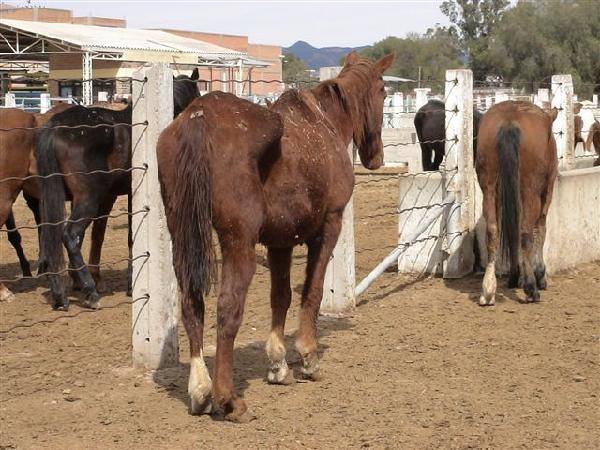 AA met with representatives of the European Commission Food and Veterinary Office in Ireland on Nov 9 to discuss plans of action regarding horse meat imported from Mexico and animal welfare concerns documented by AA at the Mexican plants. AA is the first organization invited to Ireland to talk with the EU Commission about these issues. The meeting was also attended by the EU inspectors who had visited the plants in 2008 and 2009.
AA met with representatives of the European Commission Food and Veterinary Office in Ireland on Nov 9 to discuss plans of action regarding horse meat imported from Mexico and animal welfare concerns documented by AA at the Mexican plants. AA is the first organization invited to Ireland to talk with the EU Commission about these issues. The meeting was also attended by the EU inspectors who had visited the plants in 2008 and 2009.
We were eager to learn from EU officials about a 180 day quarantine for horses intended for slaughter. The 180 day quarantine before slaughter would allow harmful drug residues in horse meat to dissipate. The issue of drug residue is of special concern to the EU and its consumers because American horses, unlike Mexican horses, commonly and regularly receive medications that are known carcinogens, etc.
However, the EU response was quite disappointing. EU officials informed us that pending further evaluation and discussion, they will accept sworn statements provided by kill buyers upon arrival at the slaughter plant declaring the horses have been drug free for 6 months.
The rumored 180 day quarantine is not currently in place, nor does the quarantine approach seem likely.
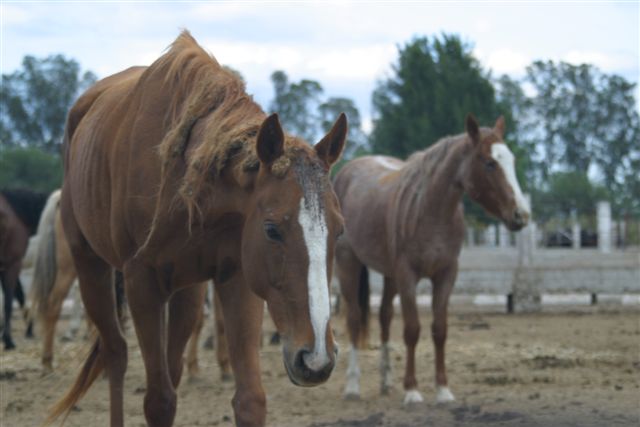 AA told EU officials this was unacceptable, that while the issue of meat tainted with drug residues certainly needs to be addressed, there is no way to verify the kill buyers' statements. True accountability is not achieved nor are safety and liability issues resolved. However at this point this is the EU plan.
AA told EU officials this was unacceptable, that while the issue of meat tainted with drug residues certainly needs to be addressed, there is no way to verify the kill buyers' statements. True accountability is not achieved nor are safety and liability issues resolved. However at this point this is the EU plan.
On the other hand, we supplied EU officials with several pieces of information that have raised their level of concern very significantly. They were extremely surprised to learn that over 100,000 horses are exported for slaughter from the United States to Mexico annually. For the EU these numbers make the drug residue issue much more immediate than if the horses were almost all from Mexico as had been their belief.
AA also showed the EU representatives the investigation report and video of the inhumane treatment of horses at the Jerez slaughter plant. They saw horses left in the kill box while workers went to lunch, the slaughter of a horse with a broken leg, horses dragged by a wire around the leg into the plant, mothers with new born foals in the slaughter plant pens, downed horses and dead horses in the slaughter plant pens.
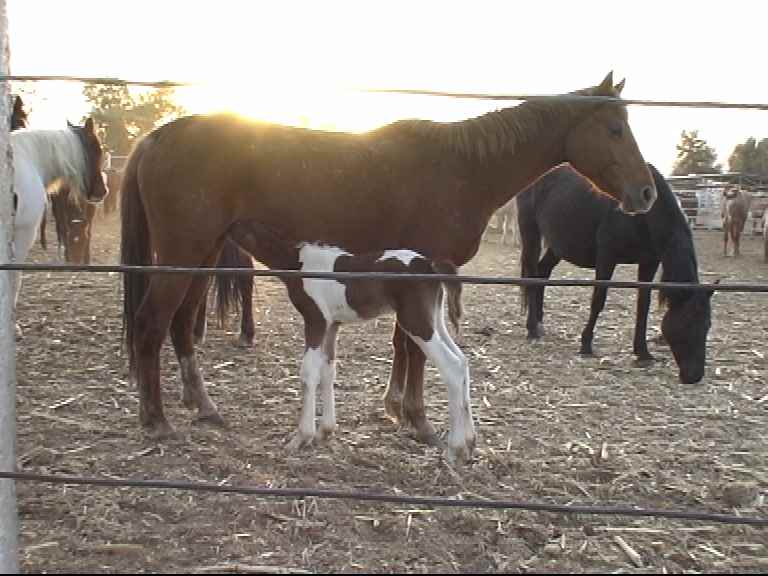 The officials and inspectors were extremely shocked by the evidence AA had obtained. They admitted that their inspectors had never seen anything like this during their visits at the plant. However, they said it is not surprising since due to international trade regulations they have to announce their inspections months in advance.
The officials and inspectors were extremely shocked by the evidence AA had obtained. They admitted that their inspectors had never seen anything like this during their visits at the plant. However, they said it is not surprising since due to international trade regulations they have to announce their inspections months in advance.
EU officials indicated that the evidence of inhumane treatment would be the basis for a formal complaint which then would lead to an official investigation at the Jerez plant. They were candidly appreciative and encouraged AA to share any new evidence with them quickly.
We believe that it was crucial to establish an open dialogue with the EU leaders since they have the power and the authority to change things fast - especially regarding the ongoing suffering at the plant.
We plan to meet with the Dutch and the Belgian importers, confront them with our findings and inform them of our meeting with EU officials. Pressure will be high because European consumers are to date almost completely unaware of the cruelties and dangers involved in the slaughter of horses for meat.
AA went ahead and filed formal complaints with the EU and the Mexican Secretary of Agriculture. We will unquestionably continue to work on this issue.
|
Cruelty investigation at Shipshewana Auction in Indiana
|
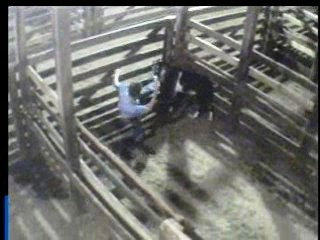 Shipshewana auction is located in one of Indiana's largest Amish communities. With around a half million visitors a year, tourism is big business in Shipshewana. AA investigators visited the Shipshewana auction on September 16, 2009. From the catwalk above the pens they filmed a young worker named Richard engaged in a "martial arts style" battle with a goat. The one-sided battle with the hornless goat went on for over three minutes. Whirling and kicking Richard hit the goat repeatedly in the nose, face and head with full force, followed by body blows and fists. Shipshewana auction is located in one of Indiana's largest Amish communities. With around a half million visitors a year, tourism is big business in Shipshewana. AA investigators visited the Shipshewana auction on September 16, 2009. From the catwalk above the pens they filmed a young worker named Richard engaged in a "martial arts style" battle with a goat. The one-sided battle with the hornless goat went on for over three minutes. Whirling and kicking Richard hit the goat repeatedly in the nose, face and head with full force, followed by body blows and fists.
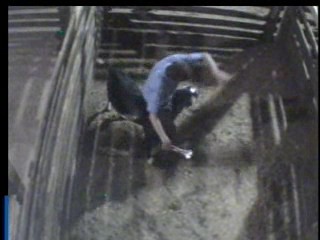 We left the auction greatly troubled but determined. Our investigation proved that the handling of the animals at Shipshewana auction is completely unacceptable
We left the auction greatly troubled but determined. Our investigation proved that the handling of the animals at Shipshewana auction is completely unacceptable
and so brutal that auction workers violate Indiana's animal cruelty laws. IC 35-46-3-12 states that "to unnecessarily or cruelly strike an animal, or to throw the animal against an object causing the animal to suffer severe pain or injury" is animal cruelty, a Class A misdemeanor.
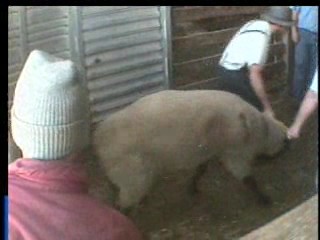 It seems obvious that Shipshewana employees have not received any or adequate training in the humane handling of animals - or the consequences of violating animal cruelty laws. No supervision by auction management was ever observed, making management at the Shipshewana auction appear equally culpable for negligent and inhumane treatment.
It seems obvious that Shipshewana employees have not received any or adequate training in the humane handling of animals - or the consequences of violating animal cruelty laws. No supervision by auction management was ever observed, making management at the Shipshewana auction appear equally culpable for negligent and inhumane treatment.
AA has filed a complaint along with supporting documentation of the incident with both state and federal agencies.
AA requested the following:
- that auction management and the young worker who violated Indiana animal cruelty laws are prosecuted for animal cruelty.
- that the young worker's employment by the auction is terminated immediately.
- that auction management has all employees thoroughly trained in the humane and legal handle animals.
- that auction management provides adequate supervision of employees to ensure compliance with animal cruelty laws and welfare standards.
What has happened:
AA was notified last week that the employment of the worker has been terminated. Furthermore, auction management has informed the rest of their employees that there is a zero tolerance policy for employees found improperly handling livestock and all employees have received additional training.
To read the full report please click here and scroll down to Shipshewana auction.
|
Work at California auctions shows effect
|

A very busy but productive round of recent investigations has produced positive results. Training and policy changes have been put into practice at some California auctions as a result of Animals Angels investigations.
AA investigations revealed several California livestock auctions operating with complete disregard for laws enacted for the protection of downer cows. Cows unable to stand were clearly visible to staff and often in high traffic areas. Left to die in the pen, they never received veterinary care despite the requirement for immediate action.
The law is unambiguous. California Penal Code 599f (d) clearly states, "No stockyard, auction, market agency, or dealer shall hold a nonambulatory animal without taking immediate action to humanely euthanize the animal or to provide immediate veterinary treatment."
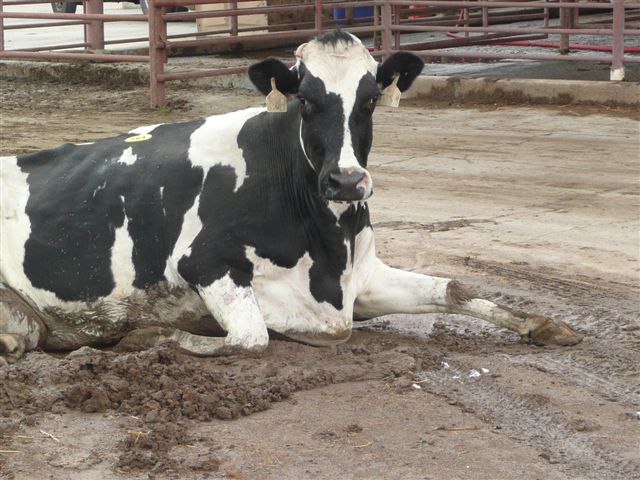 One especially egregious violator has been the Escalon auction. AA investigators visited August 2008 and again in April 2009, when they noted "The condition of older dairy cows was simply appalling." On both occasions, investigators found downer cows ignored by auction staff, in clear violation of existing state laws.
One especially egregious violator has been the Escalon auction. AA investigators visited August 2008 and again in April 2009, when they noted "The condition of older dairy cows was simply appalling." On both occasions, investigators found downer cows ignored by auction staff, in clear violation of existing state laws.
Documentation in hand, AA filed reports with authorities and met with the State Veterinarian and law enforcement.
The eventual result, after more than a year's continuing follow up, is positive. All employees at the Escalon auction have been trained to understand relevant laws. They have been directed not to let animals suffer and die in the pens anymore. During our last visit in September 2009, we observed that CA law was followed and two downed animals were immediately euthanized. A far cry from our August 2008 and April 2009 observations.
Still of significant concern is the Oakdale auction where in September AA investigators observed a suffering downer cow die after 7 hours in near 100 degree heat - without ever being provided with humane care or euthanasia as the law requires. AA has reported the incident to law enforcement.
One final note: Besides ongoing investigations at these and other locations, Animals Angels has created a straightforward manual for auction markets on the care and handling of downers. Included are relevant laws and corresponding fines. Distribution at high risk auctions is underway.
____________________________________________
|
AA investigation reveals cruel
transport conditions for
"Farmer
John" pigs
|
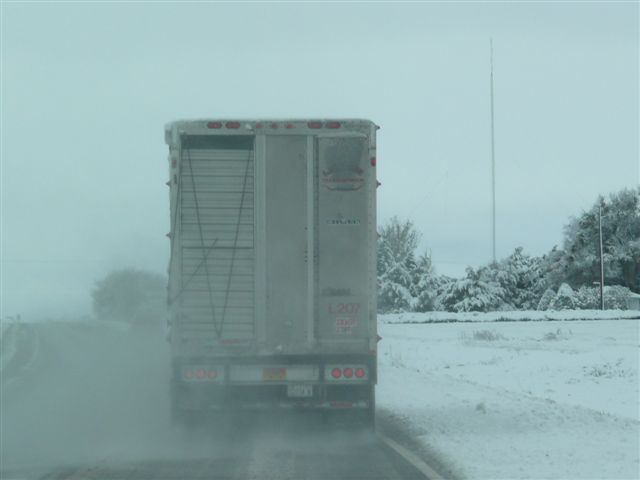 AA found that the Los Angeles "Farmer John"
slaughter plant owned by Hormel is
transporting slaughter pigs long distances,
sometimes more than 1,100 miles.
AA investigators went to Yuma, Colorado
where several intensive farming facilities
operate, each barn holding thousands of
sows at any one time. These massive
farms ship pigs to Los Angeles for
immediate slaughter almost every day.
AA found that the Los Angeles "Farmer John"
slaughter plant owned by Hormel is
transporting slaughter pigs long distances,
sometimes more than 1,100 miles.
AA investigators went to Yuma, Colorado
where several intensive farming facilities
operate, each barn holding thousands of
sows at any one time. These massive
farms ship pigs to Los Angeles for
immediate slaughter almost every day.
With 4 feet of snow on the ground and
temperatures below freezing, investigators
followed a truck with "slaughter" pigs
loaded onto three decks. A check of the
truck's company records revealed that
that just one month previously in
September,
they had been fined $28,120.00 for
37 counts of falsifying duty
reports-their driving time
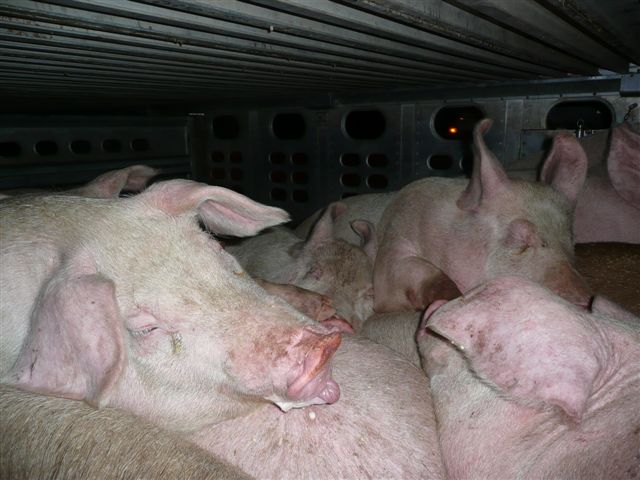
By the time the truck and AA
investigators reached Los Angeles,
we had observed several areas of concern:
To read the full report, please click here
and scroll down to the Farmer John
investigation.
What can you do?
Tell Hormel Foods that you are very
upset about the poor treatment of
pigs shipped for their Los Angeles
plant and that you will not buy any
of their "Farmer John" brand products
anymore until the company improves
the transport conditions.
Clougherty Packing LLC
President Greg Longstreet
|
|
|
|
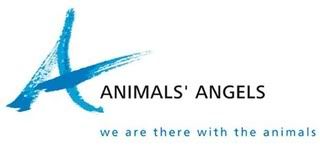



















No comments:
Post a Comment